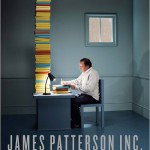
Facebook Twitter Pinterest Flickr Google+ YouTube Instagram
Written on: January 25th, 2010 by: in Blog Posts
 The feature article in this week’s New York Times magazine was a fascinating article about James Patterson’s one-man publishing industry. The internationally best-selling author comes over as very likable in the article, and certainly industrious. I have developed a great affection for him since his launch of a children’s literacy website, Read Kiddo Read. Patterson unashamedly writes for his audience, and while he himself is well-read, doesn’t really have literary pretensions:
The feature article in this week’s New York Times magazine was a fascinating article about James Patterson’s one-man publishing industry. The internationally best-selling author comes over as very likable in the article, and certainly industrious. I have developed a great affection for him since his launch of a children’s literacy website, Read Kiddo Read. Patterson unashamedly writes for his audience, and while he himself is well-read, doesn’t really have literary pretensions:
Patterson considers himself as an entertainer, not a man of letters. Still, he bristles when he hears one of his books described as a guilty pleasure: “Why should anyone feel guilty about reading a book?” Patterson said that what he does — coming up with stories that will resonate with a lot of people and rendering them in a readable style — is no different from what King, Grisham and other popular authors do. “I have a saying,” Patterson told me. “If you want to write for yourself, get a diary. If you want to write for a few friends, get a blog. But if you want to write for a lot of people, think about them a little bit. What do they like? What are their needs? A lot of people in this country go through their days numb. They need to be entertained. They need to feel something.
Motoko Rich’s article about book clubs v. solitary readers was another interesting read, and included this link to a review site for young adult readers that is worth checking out (if you are a teen- you can’t register if you’re an adult).
Finally, the reviews!